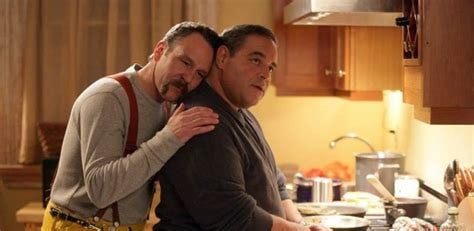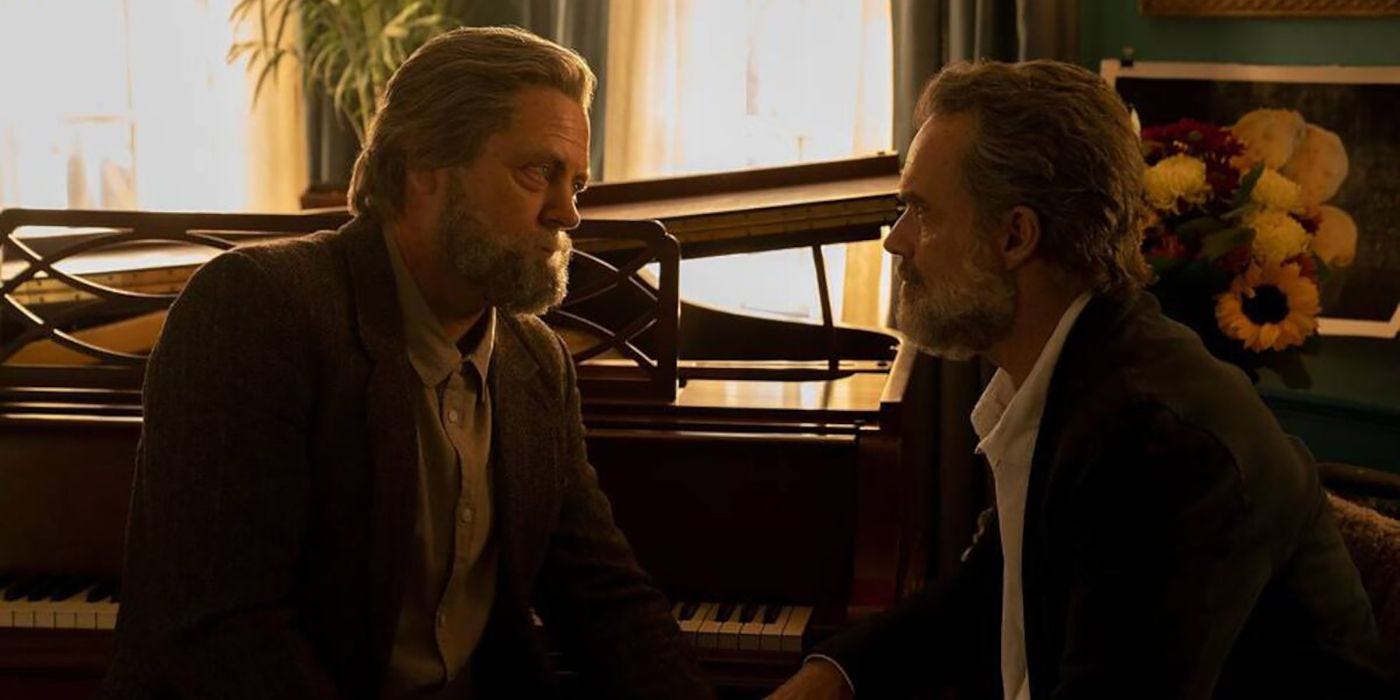The TV show The Last of Us has been a commercial and critical hit, but its episode by episode review scores tell a different story: maybe even the dreaded story of the critic/audience review gap. Based on the video-game of the same name, and co-created by Neil Druckmann and Craig Mazin (I wish some relation) the show is a post-apocalypse story, the apocalypse zombies, the zombies fungal. Its inaugural season recalls (intentionally?) the film Children of Men: a grizzled cynic, in this case Pedro Pascal as Joel, is sent on a mission by a female terrorist-cell leader to ferry a girl to a secret team of scientists. But the girl, in this case Bella Ramsey as Ellie, isn’t carrying the first pregnancy in years but the first immunity to zombieness.
In those same years unfolds the story of episode 3, ‘Long, Long Time.’ In it Nick Offerman plays Bill, a vindicated survivalist and logical extension of Offerman’s anti-government character Ron Swanson from Parks and Rec. One day, into Bill’s amply supplied solitude stumbles Frank, played by Murray Bartlett of White Lotus fame—that is, stumbles and falls into one of Bill’s mantraps. Frank persuades Bill to spare him, then to let him into his compound for a meal, then to let him into his heart. (Which other prestige TV stars could’ve been match-made for this episode? Brian Cox with Larry David?) The next twenty years of Bill and Frank’s lives together are told over the next hour or so, a telescoped love story made up of time-jumping scenes like David Nicholls’ One Day or the Lost episode ‘The Constant’.
‘Long, Long Time’ has been rated more than merely the best episode of a generally well-rated series. Jack King for GQ wrote that it was “one of the best TV episodes we’ve seen for years”; Germain Lussier for Gizmodo: “one of the best, most unexpected episodes of TV we’ve seen in a while”; John Nugent for Empire magazine: “moving, surprisingly romantic, and one of the finest hours of television in recent memory.” Yet the audience scores for the same episode on IMDb and Metacritic are among the season’s lowest.
Going by a what-did-I-expect? unedifying review of the low scores’ related comments, they’re in large part down to the episode’s gay romance. But then we are living through the heady return of homophobia. (Conservatives, having gone to ground for a decade or two, are just back on their old shit; much of the neohomophobia comes from concern-trolling liberal commentators.)
Takeable in slightly better faith are criticisms that the episode departs too much from the video-game. (Like Bill the people making these criticisms are like constitutional originalists.) Though Bill in the video-game did refer to a partner called Frank, the two of them might’ve just been doubles partners at tennis. Wait, that sounds like a euphemism. Fiduciary partners. Others have down-rated the episode for not furthering the wider zombie story (relatedly, the highest user-rated episodes are the ones with the most zombie killing action). This too is unfair. Episode 3 is not a standalone. While framed in the present by Joel and Ellie’s story, it’s also crossed at a point some years before by Joel and his then-partner Tess’s story. The stories dovetail when a posthumous letter from Bill to bereaved Joel cements his bond with Ellie and his protectiveness over her. So it’s not completely paranoid of the show’s creators to take criticisms of the episode with an eyebrow raised. Some have even blamed its low user-ratings on review-bombing, a coordinated campaign by disgruntled and gay-triggered fans.
We’ve been here before, culturally. There’s already been a celebrated and popular HBO show that annoyed its fanbase with a love story between one closeted and one out gay man of bearish type in a rural setting.
In the penultimate semi-season of The Sopranos, the show’s endgame was precipitated by the outing of mobster Vito Spatafore (Joseph Gannascoli, above right). Fled from the mob to the New Hampshire woods, Vito formed an unlikely but touching relationship with short-order cook Jim (John A. Costelloe, unpelvically hugging left). The peak, or pits, depending on who you ask, of this story arc was the episode ‘Johnny Cakes’, the name coming from Jim’s fried speciality, Johnny Cakes. (Did you know Americans have fifty words for pancake?)
Food is also the first tentative link between the respectively cagey and hungry Bill and Frank. Years later Frank repays the nourishing favour, growing for Bill’s birthday a surprise patch of strawberries. Vito and Jim’s relationship has far from the same sweetness or staying-power. Vito can’t live up to his dream alternate life: he doesn’t get why Jim would be a volunteer fireman, can’t bear to be a working stiff for more than a morning let alone a day. He leaves Jim and returns to New Jersey, where his intolerable presence among his former mob pals fires off an all-out gang war.
Released as it was in 2007, we might expect the backlash to the Sopranos episode to have been more openly homophobic (though, as we’ve seen in 2023, social progress isn’t ascendant and permanent but a cyclic boom-and-bust). Other criticisms centred on how jarring the episode felt: Gannascoli, who to be fair did bring show-runner David Chase the real life news item about a gay mobster that inspired the storyline, had the comedic but not dramatic chops to pull it off. And, really, a TV show descended from the film Goodfellas all of a sudden having pastel lighting and romantic motorbike rides and hayfield cuddles?
The near-cheesiness was intentional. A few episodes earlier, to cue us for how to take ‘Johnny Cakes’, there played on TV in the home of Vito’s abandoned family a clip from Imitation of Life, directed by Douglas Sirk. Sirk was famous for tinsel-bright Americana melodramas, often tragic ones about love across a divide. By framing a clip from the film on a TV set, The Sopranos nudged its audience to frame Vito and Jim’s own episode of romance in Sirkian terms: that is, verging on camp, too good to be true, and with a dark sad undercurrent.
But what about the romance in the context of the show at large: why introduce a gay love story into the last few episodes of a long-running mob show? Because so much of that show was about masculinity at its most extreme and therefore most paranoid. It’s also pretty funny of David Chase & co. to have the endgame of their whole show, six seasons of macho mafia mayhem, hinge on the Soprano crew’s no homo freak-out and gay panic. Tony’s prevaricating about what do with outed captain Vito is a compromise too far for rival boss Phil, while Sil and Carlo’s reaction to some razzing about Vito is as explosively, disastrously violent as whenever any German in Inglorious Basterds finds out Diane Kruger’s character is a spy.
David Chase has always had an ambivalent relationship with his audience, saying of the Sopranos ending, and I paraphrase, that he didn’t want the same people who’d been cheering Tony on in his evil ways to then have the bourgeois satisfaction of seeing him end face down in a bowl of spaghetti. So too can the Vito/Jim love story be seen as a conscious tweak of the audience, or at least that part of it that critics at the time coined the ‘less yakking and more whacking’ crowd. The gay love story was meant to jar, meant to make the audience squirm.
This is not what was meant, going by the positive critical reception, with The Last of Us’s ‘Long, Long Time.’ For Empire magazine the episode was “surprisingly romantic”, for IGN “remarkably touching”, for The Guardian, “absolutely magical.” From Wikipedia:
the Radio Times’s Adam Starkey felt the depiction of a mature gay relationship set a benchmark for the medium; Slate’s J. Bryan Lowder recognized the importance of normalizing a gay relationship amidst anti-LGBT rhetoric including anti-gender movements and LGBT grooming conspiracy theories.
Much of the positive critical reception hinged on the episode’s ending. One night some raiders fail to live up to their name in laying siege to Bill and Frank’s home. Bill, though armed with a long-range rifle and inside a compound which has a tall church spire, shoots from ground level and in open view, and hence gets shot and injured, fatally so, were it not for the ministrations of Frank. But it’s Frank who’ll need Bill’s help. In a world without hospitals he falls ill next, with what looks like cancer. Eventually, exhaustedly, he requests Bill assist his suicide with an overdose. Against Frank’s wishes, Bill joins him in taking the overdose after they’ve shared one last perfect meal.
Though both lovers die they don’t do so because they are gay (though some critics still saw the gay love story ending in illness as AIDS-coded).
In any case the ending is meant to be, in Frank’s own bowled-over words, “incredibly romantic.” A bittersweet, even happy ending of sorts, like if Romeo and Juliet knew the other was taking poison and were both doing so willingly since the rest of the Montagues and Capulets had become zombies. Angry viewers might’ve disliked the episode’s soppy departure from the show’s more general bleakness and cynicism, but this was the very thing that critics approved.
I’m not sure it was so uncynical. Take this ‘bittersweet’ ending. Frank says he should be furious when Bill reveals he’s also taken an overdose, but instead he’s swept off his feet: Bill carries him to bed where they die in each other’s arms.
But your death is yours, it belongs to you alone. Muscling in on someone else’s, at first in secret, without asking, is not the act of a romantic who’s “satisfied” that he’s fulfilled his “purpose” and so can now depart alongside you, but of a narcissist. Mine mine, all mine! Even your death is my story!
Narcissism valorised as romance unfortunately links to how respectable the love story is too. The lovers, apart from their politics, are conscientiously well matched in all other criteria, avoiding scolding from any corner. They’re practically a mirror image. (There’s that narcissism again.)
Bill and Frank share their first kiss under the covers, while in The Sopranos Jim more explicitly rolled Vito over in bed (Paulie Walnuts: “Catching? Not pitching?!”) As a friend pointed out, the shared content of a gay love story but the different ways said content was presented turn out to be much more subversive in 2007 than in 2023. (It’s a testament, though, to what an ugly pass we’re at as a culture when an eminently respectable gay love story like Bill and Frank’s still makes some people scream at their screens.)
Respectable can mean sentimental which can mean cliché. Bill and Frank breach each other’s loneliness with alternating piano renditions of a Country and Western weepy (by Linda Ronstadt; Dolly Parton would’ve been too obvious). The arc of their story has a freer, sassier Frank loosening up wingnutty Bill. It’s as though billions of people had to die of a plague all so a right-winger could be shown light and life by a fitness-conscious arts-appreciative gay liberal. Turns out panda is not just a bear.
(In a later episode the show also hints at Ellie’s own burgeoning same-sex attraction, as is fully developed in the sequel to the video-game. Is the point of The Last of Us to celebrate queer love in a post-apocalyptic setting? As if the thing that fell wasn’t civilisation but heteronormativity? Maybe the real zombie was the nuclear families we didn’t make along the way.)
The Last of Us was never trying to tweak the ‘less gay-romping and more brain-chomping’ crowd. Their overreaction was incidental. Episode 3 was meant for your already on-side critic and viewer. (It’s the kind of TV show Ellie and Frank would’ve watched.) For all its violence, The Last of Us is, for a horror story, audience-friendly. You could watch it with your parents and not flinch.
For the critics who rate The Last of Us, its quality is that it’s simultaneously the best video-game adaptation ever1, and it departs from being a video-game: not only with stories like Bill and Frank’s but other quiet, tender, small ones like that of Ellie and her friend Riley and their trip to a derelict shopping mall. This is what makes the show so “surprising”, “unexpected”, so innovative.
Innovation isn’t an intrinsic quality. It’s relative to an art-form and has to be couched in the timeline of its progress. For The Last of Us video-game in 2013 to have a sequence where you as Ellie goof around a derelict shopping mall and play imaginary Mortal Kombat was innovative. For a TV show in 2023 to have the same sequence as a sort of bittersweet near-bottle-episode interlude is static and staid.
In a cultural moment when anything can make anyone react in any way, you may as well push things further; as I wrote in my review of the TV show Ramy, there’s no such thing as too far if your heart is pure. What The Sopranos and David Chase show is that a certain distance from your audience is healthy. They aren’t your surrogates or your peers or even your oppressors. Whether they’re calling for less yakking and more whacking, less gay-romping and more brain-chomping, or even for less gritty violent cynicism and more ‘touching’ ‘romantic’ ‘magical’ episodes, it’s best to resist. To just say no to that traditional zombie adage of:









